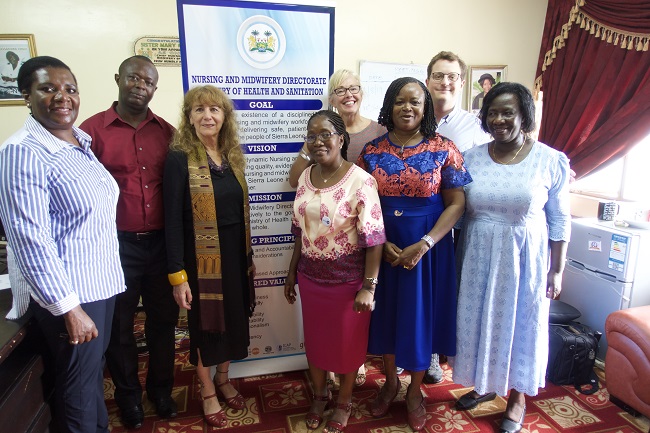Frontline Nurses:
About
Frontline Nurses: Leaders in Pandemic Response formed in 2018 to study the role of nurses and midwives as change agents in prevention, detection, and response to pandemic infectious disease outbreaks. It is widely acknowledged that nurses are crucial to combatting pandemics, but nurses are generally excluded when municipal, state, and international policymakers gather to set protocols and priorities for pandemic response. This is a dangerous and consequential omission.
Nurses comprise 70% of the global health workforce, and during infectious disease outbreaks they deliver the majority of treatment, creating and supporting hygienic standards, devising and implementing protocols for infection control, building resilient teams, and working with communities on safety measures. Successful containment of epidemic outbreaks requires local knowledge and familiarity with how people live, and nurses and midwives have the trust of the communities they serve, together with a powerful ethical commitment to their work, despite the danger and sacrifice it demands.
When the Ebola Virus Disease broke out in western African countries in 2014, nurses helped end the outbreak despite a slow international response, weak health care infrastructure in the region, and the lack of either effective therapies or a vaccine. The work of defeating Ebola happened on the frontlines, and it was work driven by nurses.
The failure to incorporate nurses’ knowledge is pervasive at all levels of healthcare workforce delivery, from the top down. As our interviews document, nurses have crucial insights and innovations that derive from their hands-on experience. Yet the World Health Organization (WHO), for instance, had no role for nurses in its leadership team until 2017. When we surveyed international health policy guidelines, we found almost no inclusion of nurses. One explanation for this startling absence is that 80% of nurses in most regions of the world are women, and women continue to be strikingly underrepresented in health care leadership roles because of both gender bias and the hierarchical, MD-centered organization of the health care workforce.
It is in this context that Frontline Nurses works to document the role of frontline nurses in pandemic disease outbreaks, to recognize nurses for their critical contribution to public health during emergencies, and to advocate for nurses’ role in health care policymaking.
Frontline Nurses draws on the work of the health science community – nursing, medicine, and public health – as well as the scholarship on health security and regulation and on gender in professional cultures. To document the role of nurses, we employ the methodology of oral history developed by the Columbia Center for Oral History Research. Our group members come from many parts of the world and many different backgrounds.

From left to right, Mwansa Nkowane, Senesie Margao, Jennifer Dohrn, Mary Fullah, Susan Michaels-Strasser, Joan Shepard, Jeremy Orloff, Margaret Phiri, Freetown, Sierra Leone, summer 2019.
Project participants:
Frontline Nurses: Leaders in Pandemic Response is a working group supported by the Women Creating Change initiative of the Center for the Study of Social Difference at Columbia University, in collaboration with the Liberian Board of Nursing and Midwifery and the Sierra Leone Nurses Association.
Mary Marshall Clark, Senior Research Scientist, INCITE (Interdisciplinary Center for Innovative Theory and Empirics and Director), Columbia Center for Oral History Research
Jennifer Dohrn, Assistant Dean, Office of Global Initiatives and Assistant Professor at Columbia School of Nursing
Alex Gil, Digital Scholarship Librarian, Columbia University Libraries.
Wilmot James, Senior Research Scholar, Institute for Social and Economic Research and Policy, Columbia University
Susan Michaels-Strasser, Assistant Professor of Epidemiology, Columbia University Medical Center
Annette Mwansa Nkowane, Former Technical Officer of Nursing and Midwifery, World Health Organization (WHO)
Margaret Loma Phiri, Nursing and Midwifery Advisor, Seed Global Health/Malawi
Victoria Rosner, Dean of Academic Affairs, Columbia University School of General Studies and Adj. Associate Professor of English and Comparative Literature
Project Coordinators:
Kurt Holuba, Columbia School of General Studies (GS)
Mina Shah, GS
Hannah Bender, Columbia College (CC)
Jeremy Orloff, GS
Research Associate
Erica Anderson, GS
Student Associates
Emma Anderson, GS
Erica Anderson, GS
Emily Bartlett, Columbia School of Nursing (SN)
Lia Mary Farrell, GS
Sarah Gleason, SN
Corie Hahn, GS
Ming Pei, GS
Thomas Peterson, GS
Franci van Ryhn, GS
Maureen Saylor, SN
Katarina Skoko, GS
Lewis Rubin Thompson, GS
Romesh Withanage, GS
Alix Duarte Gomez, SN
Liliana Silebi, SN
Maggie Town, SN
Mary Howard, SN
Maher Benham, SN
Ben Duva, GS
Jazz Cagan, GS
Aimee Akers, SN
Dana Ljubicic, GS
Michaela Rahimi, SN
Meika Folkerts, GS
Nicole Cordero Callahan, GS
Jordan Arbelaez, SN
Michelle Garofalo, SN
Margaret Murphy, SN
Runwei Wang, GS
Secunda Kariuki, GS
Amei Shank, GS
Eleanor Story, GS
Production
Architecture and development by Alex Gil.
Design by Channel Studio.
Hosting and support by Columbia University Libraries. Digital exhibit pages produced using Wax by Marii Nyrop.
Special Thanks
Special thanks to Dolphine Buoga, Ayah Eldosougi, Marianne Hirsch, Lorraine Frazier, Cecelia C. Kpangbala Flomo, Yu-Hui Ferng, Mary Fullah, Darboi Korkoyah, Elaine Larson, Nancy K. Miller, Catherine LaSota, Steve Nicholas, Joan Shepherd, Mame Toure, Paige West.
You can find us on social media on,
Instagram | Twitter | Facebook
Or contact us at,
frontlinesnurses@gmail.com.